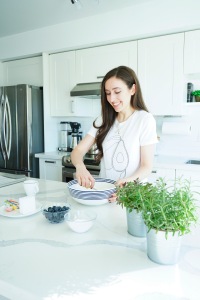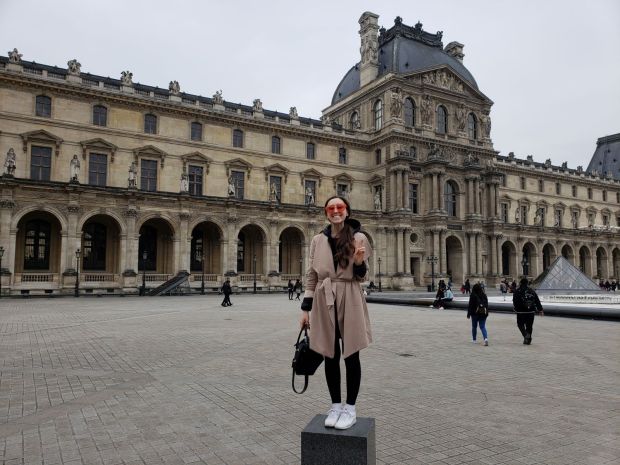 Food allergy blogger and entrepreneur Amanda Orlando was diagnosed with multiple food allergies as a very young baby. Her parents knew something was wrong because she was constantly ill from feeding and covered in eczema. Throughout the course of her life, Amanda has experienced several severe reactions, but she began blogging about life with food allergies after an especially impactful reaction at the age of 24. Amanda is also the author and photographer behind Allergen-Free Desserts (2015), and Everyone’s Welcome (2019).
Food allergy blogger and entrepreneur Amanda Orlando was diagnosed with multiple food allergies as a very young baby. Her parents knew something was wrong because she was constantly ill from feeding and covered in eczema. Throughout the course of her life, Amanda has experienced several severe reactions, but she began blogging about life with food allergies after an especially impactful reaction at the age of 24. Amanda is also the author and photographer behind Allergen-Free Desserts (2015), and Everyone’s Welcome (2019).
AllergyBites: What foods are you allergic to today?
Amanda Orlando: Peanuts, nuts, dairy, soy, and most legumes (chickpeas, peas, beans, lentils). I was diagnosed with anaphylactic allergies to peanuts, nuts, dairy, egg, soy, legumes, chicken, and pears, when I was just a few months old. As I grew up, my restrictions changed. I now enjoy chicken, eggs, and pears regularly. My allergy to soy and legumes has gone up and down over the years, so I go for annual testing to keep track of where my body is at.
AB: Can you describe the first time you truly understood you had food allergies because they impacted your life in a meaningful way?
AO: I first understood I had food allergies when I started kindergarten. As there were no other kids in the class with food allergies, I sat alone in the corner to eat any time food was served. I also had to wear a medic alert bracelet and a fanny pack for my EpiPens, so it was pretty clear to everyone in the class that I was different.
AB: Have you ever experienced an anaphylactic reaction? If yes, what happened?
AO: I’ve had about 7 anaphylactic reactions requiring an EpiPen in my life. The most recent one was a couple years ago . As an adult, I felt much more present during reactions than I did as a child, and I have a more vivid memory of how my most recent one unravelled. I was eating my morning toast and coffee, when I suddenly noticed I had a very itchy mouth and eye. I kept rubbing, but it just wouldn’t go away. One glance in the mirror and I could see that it was a more severe reaction taking place, as I was swollen in my eye and mouth area. From there, it escalated and my tongue and hands started to swell. I was living with my brother at the time so he administered epinephrine and Benadryl, and got me to the hospital safely and quickly. Soon after, I began vomiting and feeling faint. The doctors worked very quickly and gave me an IV cocktail of antihistamines and steroids. I then spent the day passed out in a hospital bed and had a week’s worth of pills to take home with me to prevent the reaction from recurring. We sent the bread I had eaten that morning to a lab to have it tested for allergens, and it came back positive for casein. From there on, I faced a very long road of allergy anxiety and fear of food.
AB: How were your parents when it came to letting you participate in everyday activities?
AO: My parents rarely ever allowed my allergies to come in the way of enjoying activities. We even ate out as a family quite often, especially when I was a teen. When travelling, we favoured road trips across Canada or to the US, or we’d head to Italy where my dad speaks the language fluently. My mom has a nut and peanut allergy, and my brother is allergic to nuts, peanuts, cantaloupe, and certain shellfish. But we have always been determined not to let it hold us back! My parents often brought my own food so that I wouldn’t be left out.

AB: In retrospect, is there anything you wish your parents had done differently?
AO: No, I think I was pretty fortunate with how they handled my allergies. We didn’t have a dairy- or nut-free house, which I’m really happy about in retrospect, because I grew up with some familiarity with these ingredients.
AB: Have you ever thought about what your parents’ grieving process looked like? Do you think they ever reached the “acceptance” phase?
AO: I think I was so young when their grieving process happened that I don’t remember it. They definitely accept it now, but I think up until a few years ago, they still held some optimism that I might grow out of my dairy allergy.
AB: As someone who grew up with food allergies, what’s the #1 tip you’d like to share with other parents trying to keep their little ones safe?
AO: It’s important to instill a strong sense of self confidence and self reliance in kids with food allergies. Ultimately, handling one’s own safety is one’s own duty, especially as kids get older. Having the confidence to do what you need to do to keep yourself safe, and to also own your allergies as part of who you are, is so key. If I had been more confident in myself as a teen, I wouldn’t have hidden my allergies so often, which led to putting myself in sometimes risky situations because I was worried about looking like a ‘loser’.
AB: What were your biggest challenges as a ‘food-allergic kid’? Now that you’re all grown up, have those challenges evolved?
AO: Looking back, my biggest challenge was my constant quest to feel or appear ‘normal’ as a kid. When I reached pre-teen age, the other kids were suddenly very aware of the fact that I carried medication with me at all times, that I never participated in hot lunches, that I brought my own slice of cake to birthday parties. I was bullied from time to time in school about my allergies and my eczema. At the time, I felt immense pressure to conceal my allergies so that people wouldn’t think I was different or weird. I was tired of sitting at a separate table from all the other kids and feeling segregated. I wanted to participate in everything. I was often told that as you grow up, you have less f*cks to give, and I have to say that is absolutely true. Now I rarely care about people’s opinions about my allergies, and it is more of a logistical challenge than a social one. I’m not afraid to bring my own food to a dinner party, and I’ll bring a bottle of wine too! When someone does make a negative remark, I’m not shy about addressing it, and I don’t hold on to friends that don’t accept me for who I am.
 AB: Any tips for young adults navigating life with food allergies?
AB: Any tips for young adults navigating life with food allergies?
AO: The joys of the allergy-specific ‘birds and the bees’ conversation! Here’s my expedited version, which I learned over the years through trial and error. If you kiss someone who has eaten something you are allergic to, it can cause a serious reaction. Mouthwash doesn’t count—those teeth have to be scrubbed. If your partner doesn’t respect this rule, then you might want to question whether they’re the right fit for you. I’ve learned that it’s a good litmus test early on in relationships. Relationships where the guy made me feel bad about this rule or didn’t take it seriously didn’t last long. It’s also a good idea to share your allergies, in full detail, at the beginning to avoid awkward kiss-dodging situations like my then-boyfriend (now husband) had to endure. He was a good sport about the whole thing (Did I mention this happened in a very public place?). It’s a story that I now like to share at dinner parties, The time I ran away from Brandon’s kiss in front of my entire class.
AB: How often do you eat out?
AO: These days, I eat out a lot less than I used to. When travelling, I generally eat out every day.
AB: Where are your go-to SAFE eating spots in Toronto (and beyond)?
AO: The Keg in Toronto, Hype Food Co, and some of the Oliver and Bonacini restaurants. When in NYC, I love to eat at Bistango or places with a raw bar. I enjoy a good sashimi platter too.
AB: Can you tell me why The Keg makes you feel safe?
AO: The Keg (any location) does a fantastic job of making me feel safe because they bring the manager over right away to confirm the allergy, which plate it applies to, what modifications will be made, and that they will avoid cross contact. Then the manager or chef drops the plate to the allergic person and reiterates their allergies.
AB: Tell me about Everyday Allergen-Free.
AO: My blog, Everyday Allergen-Free, aims to inspire confidence in teens and adults living with food allergies. As you can gather from my answers to the above questions, confidence and anxiety were my two biggest struggles growing up. I can’t say I’ve fully conquered either battle, but it certainly helps to share my experiences and learnings with such an engaged and interested community. I think we can all learn from each other. I also love to cook and of course, take food photos, so I share plenty of recipes. One of my favourite parts about the blog is that I invite other bloggers or advocates to guest write. Gaining their perspective is so important and I’m always happy to share with my community.
 AB: Can you tell us about your most recent book?
AB: Can you tell us about your most recent book?
Everyone’s Welcome is a resource for those living with (or who know someone living with) food allergies. It includes so many delicious and simple recipes that even the most beginner cook can prepare them with ease, using fresh, whole ingredients. The allergen guide makes the book very easy to navigate, as the recipes are all free from peanuts, nuts (excluding coconut), dairy, soy, egg, and shellfish, and many are also free from wheat, coconut, fish, and are suitable for vegans and vegetarians too. At the front of the book, I go into detail about preparing an allergy-safe kitchen, identifying allergens, substitutes, and more need-to-know info. I also share personal essays and anecdotes about living with food allergies — from an awkward encounter at a work dinner, to how I manage my food anxiety.
AB: What did you see in the Top 10 Challenge that made you want to become a Challenge Ambassador?
AO: I think it’s difficult to appreciate the challenges and hurdles that someone with food allergies faces unless you have walked a mile in their shoes. The Top 10 Challenge allows others to do just that, while raising awareness and building compassion outside of the food allergy community.
Friendly. Supportive. Encouraging.
Want to join a community of like-minded food allergy folk? Join the AllergyBites Community on Facebook.
